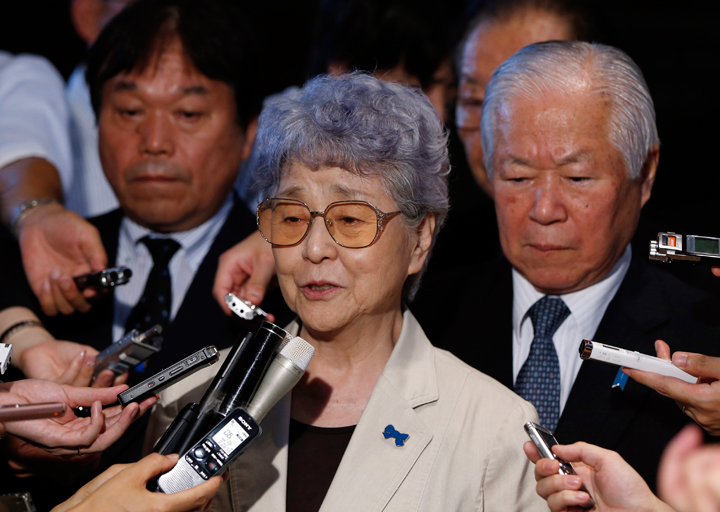TOKYO – For many families of Japanese citizens abducted to North Korea decades ago, a renewed investigation is most likely their last chance to see their loved ones.

The elderly relatives say they are pinning all their hopes on the effort before time runs out.
After decades of deadlock and waiting, they saw a door open in May when Japan and North Korea agreed on a renewed investigation of suspected abductees, most likely including their siblings and children. And on Friday, the long overdue investigation started in Pyongyang.
READ MORE: 8 heartbreaking images as separated North, South Korean families reunite
Sakie Yokota said she still believes her daughter Megumi, abducted nearly 40 years ago, is alive even though North Korea said she’s dead. Like others, Yokota says she is getting desperate, as she is already 78 and her husband, Shigeru, is 81.
Megumi was abducted by the North’s agents from Japan’s northern coastal town of Niigata in 1977 when she was walking home after a school badminton practice, when she was 13.
“All along I’ve believed Megumi is alive and that has never changed. I want her to return to Japan alive, no matter what condition she is,” Yokota said. She said the probe would lead to concrete results soon, or chances for elderly relatives to learn about their loved ones’ whereabouts would be lost forever.
“We don’t have much time left. I hope to see that happen as soon as possible, not months or years from now, because we are all getting old.”
After years of denial, North Korea acknowledged in 2002 it had Japanese citizens to train its spies in the 1970s and 1980s and eventually returned five of them. It said others Japan said were abducted had died or never entered the North. Tokyo disputes that and wants an investigation into at least 12 abductees, including Megumi Yokota.
North Korea, in a report by its Korean Central News Agency, announced a wide-ranging investigation that will look into not only the abductees but also the remains of thousands of Japanese who died in Korea at the end of World War II, as well as any survivors from that era. Japan colonized Korea from 1910 to 1945.
Private support groups say hundreds of Japanese citizens were abducted besides the 12, and suspect many may still be living in the North. Prime Minister Shinzo Abe has vowed not to relent until all the abductees are returned or accounted for.
Teruaki Masumoto, 58, said he thinks this is the best and last chance to his sister Rumiko out of the secluded communist nation. She would be 60 this year.
“This is our last chance,” he said. “We cannot wait any longer, not even another year. And this time we cannot afford to lose.”
In response to the renewed investigation, Tokyo lifted sanctions in three areas. It lifted a ban on North Koreans visiting Japan, allowing them on a case-by-case basis, and made it easier for Japanese and ethnic Koreans in Japan to travel to North Korea. It also raised the reporting limit for money taken or sent to North Korea. Thirdly, it approved port calls by North Korean ships for humanitarian purposes, limited to the delivery of food, medicine and clothes in small amounts.
Japan still abides by separate U.N. sanctions imposed because of North Korea’s nuclear and missile programs. They include an arms trade ban, a freeze of North Korean assets, a ban on people exchanges and restrictions on education and training.
Japanese officials say the eased sanctions will not give a significant economic boost to North Korea or weaken the impact of international efforts to punish and isolate the North for its nuclear weapons development.
Foreign Minister Fumio Kishida said a resumption of the “six party” multinational framework to discuss North Korea’s denuclearization is too early to consider, despite signs of improved relations between the two sides.


Comments